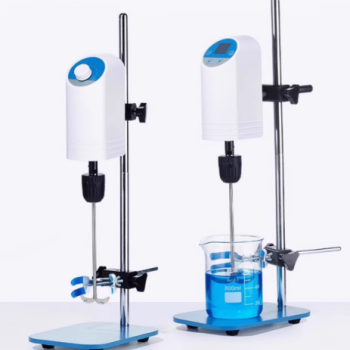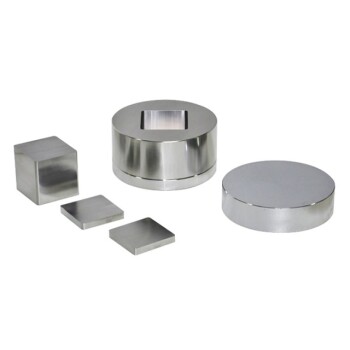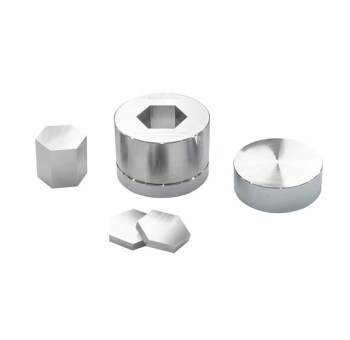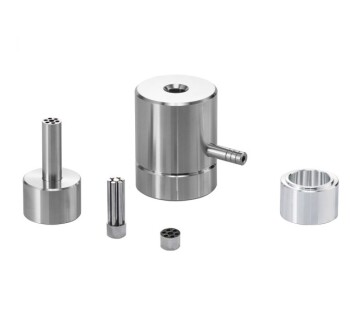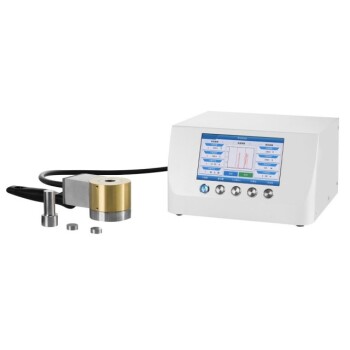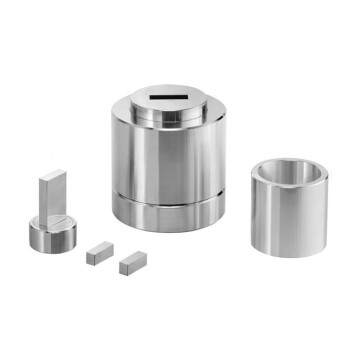In essence, Fourier-Transform Infrared (FTIR) Spectroscopy is a rapid, non-destructive technique used to identify chemical substances. Its applications are incredibly diverse, spanning from pharmaceutical quality control and forensic analysis to identifying plastics and detecting food adulteration. The core function is to analyze how a material interacts with infrared light, providing a unique "chemical fingerprint" that reveals the types of chemical bonds present.
FTIR's true power lies in its ability to act as a universal material identifier. By detecting the unique vibrational frequencies of chemical bonds, it can quickly determine the identity, purity, or composition of an unknown organic or polymeric sample.
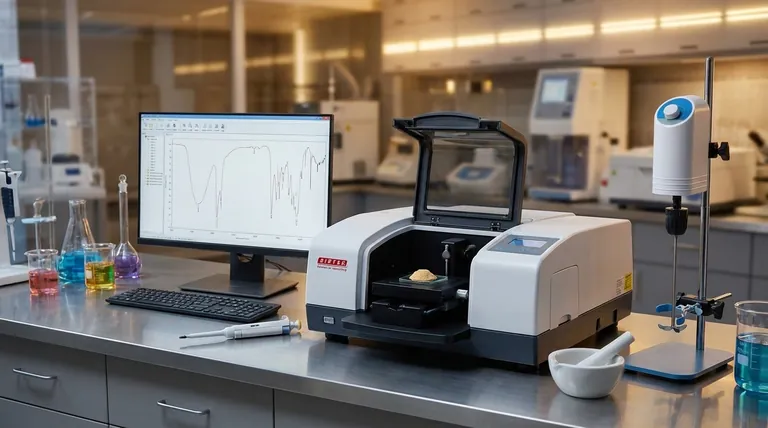
The Core Principle: What FTIR "Sees"
The versatility of FTIR comes from its fundamental operating principle. It doesn't identify molecules as a whole, but rather the individual functional groups—the building blocks of molecules—that they contain.
Identifying Functional Groups
Every type of chemical bond (like C-H, O-H, or C=O) vibrates at a specific frequency when it absorbs infrared light. FTIR measures which frequencies of light a sample absorbs.
The resulting output is a spectrum, a graph showing absorbance peaks at different frequencies. Each peak corresponds to a specific type of chemical bond, acting as a clear indicator of the functional groups present in the sample.
From Bonds to a "Chemical Fingerprint"
The complete collection of absorption peaks in a sample's spectrum creates a unique pattern. This pattern is often called a chemical fingerprint because it is characteristic of that specific substance.
By comparing the spectrum of an unknown sample to a library of known spectra, one can rapidly and accurately identify the material.
Qualitative vs. Quantitative Analysis
FTIR is primarily a qualitative tool used for identification ("What is this?"). However, it can also be used for quantitative analysis ("How much of this is present?").
The height or area of an absorption peak is proportional to the concentration of the corresponding chemical bond. This allows analysts to determine the amount of a specific component within a mixture.
Key Applications Across Industries
Because almost all organic and many inorganic compounds have chemical bonds that absorb infrared light, FTIR has become an indispensable tool in countless fields.
Pharmaceutical and Biomedical Analysis
In pharmaceuticals, quality control is paramount. FTIR is used to verify the identity and purity of raw materials and final drug products, ensuring they are free from contamination or degradation. It can also be used to study drug-protein interactions.
Polymer and Materials Science
FTIR is a workhorse for identifying plastics, rubbers, and other polymers. It is used to confirm the identity of incoming materials, analyze product failure by detecting chemical degradation (like oxidation), and ensure proper formulation of blends and copolymers.
Environmental Monitoring
Government agencies and private firms use FTIR to detect and quantify pollutants. It can identify contaminants in water, soil, and even the air, with specialized instruments capable of real-time analysis of atmospheric gases.
Forensic Science and Art Conservation
Forensic labs use FTIR to identify trace evidence like paint chips, fibers, adhesives, and unknown drugs or powders. Similarly, art conservators use it to non-destructively identify the pigments, binders, and varnishes used in a painting to guide restoration efforts.
Food and Agriculture
The food industry employs FTIR to detect adulteration, such as watering down milk or adding cheaper oils to olive oil. It is also used to measure key quality parameters like fat, protein, and moisture content.
Understanding the Trade-offs
While powerful, FTIR is not a universal solution. Understanding its limitations is key to using it effectively.
Not Ideal for All Samples
FTIR works by detecting the vibrations of covalent bonds. It is not suitable for analyzing metals or simple ionic materials like sodium chloride (NaCl), which do not have the necessary bonds to absorb infrared light.
Sample Preparation Can Matter
While some samples can be analyzed with no preparation, others require specific handling (e.g., grinding into a powder, dissolving in a solvent, or pressing into a thin film) to get a clear spectrum. Water is a strong IR absorber and can interfere with results, requiring samples to be dried or special techniques to be used.
Complexity of Mixtures
Identifying a single, pure compound is straightforward. Analyzing a complex mixture, however, can be challenging because the spectral peaks of different components overlap, making it difficult to interpret without advanced statistical methods.
Determining if FTIR is Right for Your Task
Use this guide to determine if FTIR is the appropriate tool for your analytical goal.
- If your primary focus is identifying a pure organic substance or polymer: FTIR is an excellent first-line tool due to its speed, accuracy, and extensive spectral libraries.
- If your primary focus is verifying the quality of a known material: FTIR is ideal for comparing a production batch against a known "gold standard" to quickly spot deviations or contaminants.
- If your primary focus is analyzing simple atoms or metals: You must use a different technique, such as Atomic Absorption Spectroscopy (AAS) or X-ray Fluorescence (XRF).
- If your primary focus is separating and identifying all components in a complex liquid mixture: A chromatographic technique like GC-MS or LC-MS may be more effective, though FTIR can be used as a detector.
By understanding what a material is made of at the molecular level, you gain the power to control its quality, ensure its safety, and solve complex problems.
Summary Table:
| Application Area | Key Use Case |
|---|---|
| Pharmaceuticals | Quality control, raw material verification, purity analysis |
| Forensics & Art | Trace evidence identification (paint, fibers), pigment analysis |
| Polymers & Plastics | Material ID, failure analysis, formulation verification |
| Food & Agriculture | Adulteration detection, quality parameter measurement (fat, protein) |
| Environmental | Pollutant detection in air, water, and soil |
Unlock the power of material identification with KINTEK.
FTIR spectroscopy is a cornerstone of modern laboratory analysis, providing the critical data needed for quality control, research, and problem-solving. Whether you are in pharmaceuticals, materials science, forensics, or food safety, having the right equipment is essential for accurate and reliable results.
KINTEK specializes in providing high-quality lab equipment and consumables to meet your specific analytical needs. Our expertise ensures you have the right tools to perform precise FTIR analysis, leading to better product quality, faster time-to-market, and greater operational efficiency.
Ready to enhance your lab's capabilities? Contact our experts today to discuss how we can support your laboratory's mission with reliable FTIR solutions and more.
Visual Guide
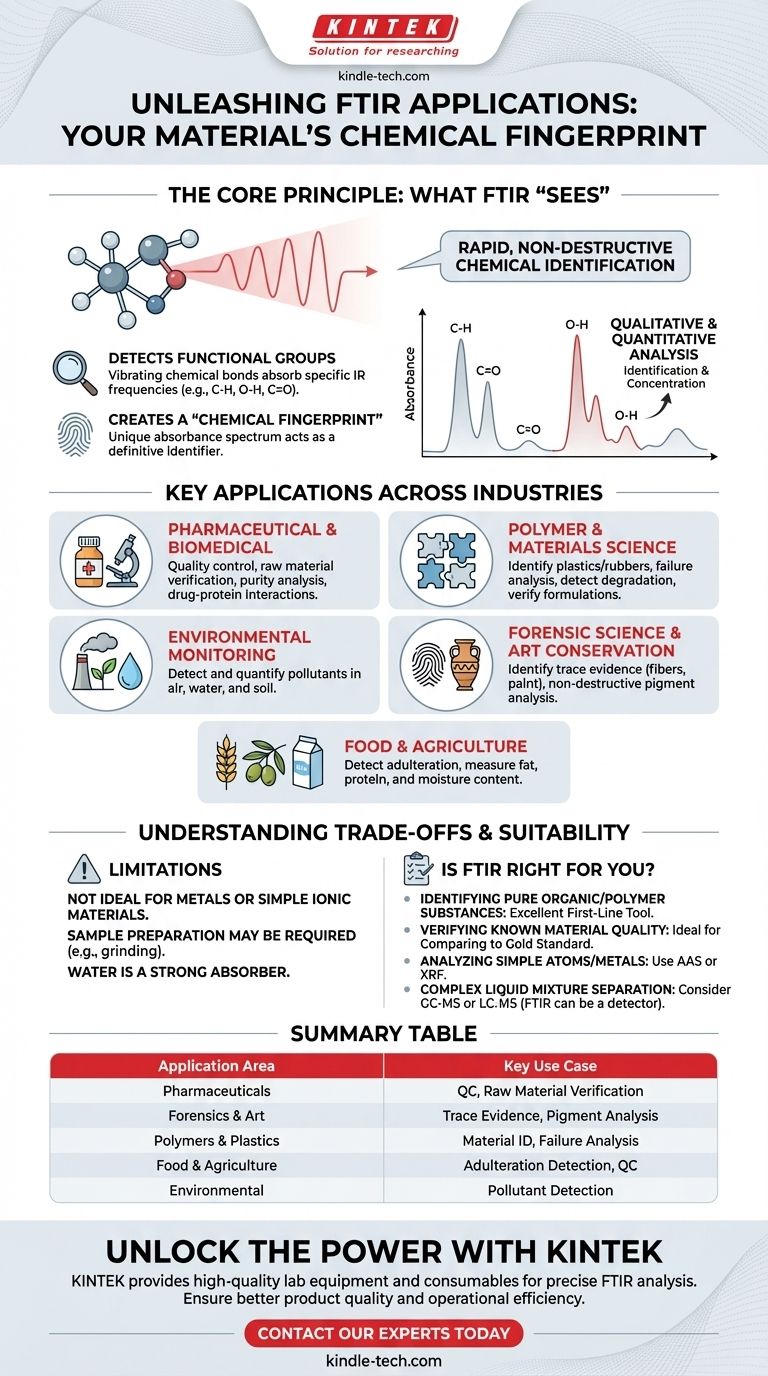
Related Products
- High Performance Laboratory Stirrers for Diverse Applications
- Automatic Laboratory Heat Press Machine
- Laboratory Disc Rotary Mixer for Efficient Sample Mixing and Homogenization
- Customizable PEM Electrolysis Cells for Diverse Research Applications
- Metallographic Specimen Mounting Machine for Laboratory Materials and Analysis
People Also Ask
- How does high-speed stirring equipment contribute to the uniformity of zinc borate suspensions? Achieve Pure Synthesis
- What critical role does a Laboratory Stirrer play during leaching? Enhance Titanium-Magnesium Waste Recovery
- What are the functions of a laboratory stirring system in enhancing the leaching efficiency of gold scrap?
- How do high-energy mixing systems improve slurry-bed photocatalytic reactors? Maximize Your Catalyst Efficiency
- What is the role of homogenization in C-S-H synthesis? Achieve Phase-Pure Calcium Silicate Hydrate Consistency
